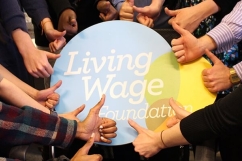The war on drugs is simply not working, according to a new report by Christian Aid.
Where old approaches to drugs treat the issue like a "malignant tumour", apart from the whole body, the reality today is that this tumour "has become an almost necessary part of the whole body, rendering conventional treatments ineffective. Removal could cause certain organs to fail," according to Eric Gutierrez, a senior advisor at Christian Aid.
The reality in many countries, including Afghanistan, Colombia, Mali and Tajikstan, is that the drugs trade is not a sub-sector of the economy that can be identified and retracted without huge implications for other parts of the economy and society.
The report, Drugs and Illicit Practices, assessing their impact on development and governance, released today, cites examples of how key state functions have effectively been subverted by the scale of the trade. It documents instances where drug networks have become providers of much-needed jobs and investment, drug barons have been elected to government office and criminal syndicates serve as shadow sub-contractors of state security.
A case study on the cocaine trade in Mali revealed how it had corrupted the governing institutions to the extent that "local communities found it difficult to distinguish whether state agents were behaving like criminals, or criminals were behaving like the state."
The paradox of the heroin trade in Tajikstan, which is usually regarded as a source of conflict and violence, has arguably "become a source of stability." The state, which was often too weak to maintain order, would collaborate with organised criminal organisations to maintain the order where their control was effective.
The report urged that the options open to development agencies stretch beyond prohibition or legalisation when tackling drugs:
"Portugal has been successful in reducing both drug abuse and drug-related crime by treating drug possession for personal use as an administrative offence, rather than a criminal felony," Gutierrez said.
"The Czech Republic follows an approach whereby public health bodies, social services, and local communities are involved, not just the police, in dealing with drug issues."
The report has been produced by Christian Aid to broaden the debate on drugs policies worldwide prior to a special session of the United Nations General Assembly early next year.
The meeting has been brought forward by three years after Colombia, Guatemala and Mexico requested it, calling for more effective responses to drug trafficking.
"It is urgent to review the approach so far maintained by the international community on drugs, in order to stop the flow of money from the illicit drug market."
They added: "Nations should intensify their efforts to further strengthen the institutions and policies of each country in the prevention and punishment of crime, their social programs in education, health, leisure and employment, as well as prevention and treatment of addictions to preserve social fabric."














